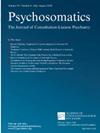Associations between Cognitive Concepts of Self and Emotional Facial Expressions with an Emphasis on Emotion Awareness
IF 3.4
Q2 Medicine
引用次数: 0
Abstract
Recognising our own and others’ emotions is vital for healthy social development. The aim of the current study was to determine how emotions related to the self or to another influence behavioural expressions of emotion. Facial electromyography (EMG) was used to record spontaneous facial muscle activity in nineteen participants while they passively viewed negative, positive and neutral emotional pictures during three blocks of referential instructions. Each participant imagined themself, another person or no one experiencing the emotional scenario, with the priming words “You”, “Him” or “None” presented before each picture for the respective block of instructions. Emotion awareness (EA) was also recorded using the TAS-20 alexithymia questionnaire. Corrugator supercilii (cs) muscle activity increased significantly between 500 and 1000 ms post stimulus onset during negative and neutral picture presentations, regardless of ownership. Independent of emotion, cs activity was greatest during the “no one” task and lowest during the “self” task from less than 250 to 1000 ms. Interestingly, the degree of cs activation during referential tasks was further modulated by EA. Low EA corresponded to significantly stronger cs activity overall compared with high EA, and this effect was even more pronounced during the “no one” task. The findings suggest that cognitive processes related to the perception of emotion ownership can influence spontaneous facial muscle activity, but that a greater degree of integration between higher cognitive and lower affective levels of information may interrupt or suppress these behavioural expressions of emotion.自我认知概念与情绪性面部表情的关系:以情绪意识为重点
认识到我们自己和他人的情绪对健康的社会发展至关重要。当前研究的目的是确定与自我或他人相关的情绪如何影响情绪的行为表达。当19名参与者被动地观看消极、积极和中性的情绪图片时,使用面部肌电图(EMG)记录他们自发的面部肌肉活动。每个参与者想象自己,另一个人或没有人经历情感场景,在每个图片前呈现“你”,“他”或“没有”作为各自的指示块。用TAS-20述情障碍问卷记录情绪意识(EA)。在阴性和中性图片呈现时,在刺激开始后的500 ~ 1000 ms内,瓦楞肌上纤毛(cs)肌肉活动显著增加。与情绪无关,在250 ~ 1000 ms的时间内,大脑皮层活动在“无人”任务时最大,在“自我”任务时最低。有趣的是,参考任务期间的cs激活程度进一步受到EA的调节。与高EA相比,低EA对应的cs活动总体上明显更强,这种影响在“无人”任务期间更为明显。研究结果表明,与情绪所有权感知相关的认知过程可以影响自发的面部肌肉活动,但更高程度的认知和更低程度的情感信息之间的整合可能会中断或抑制这些情绪的行为表达。
本文章由计算机程序翻译,如有差异,请以英文原文为准。
求助全文
约1分钟内获得全文
求助全文
来源期刊

Psychosomatics
医学-精神病学
CiteScore
3.20
自引率
0.00%
发文量
0
审稿时长
6-12 weeks
期刊介绍:
The mission of Psychosomatics is to be the leading psychiatry journal focused on the care of patients with comorbid medical and psychiatric illnesses. The scope of Psychosomatics includes original research, review articles and clinical reports that address psychiatric aspects of medical illnesses and their management. Areas of particular interest include: the effect of co-morbid psychiatric conditions on the management of medical illness; the psychiatric management of patients with comorbid medical illness; educational content for physicians and others specializing in consultation-liaison (C-L) psychiatry; and, the provision of psychiatric services to medical populations, including integrated care.
 求助内容:
求助内容: 应助结果提醒方式:
应助结果提醒方式:


